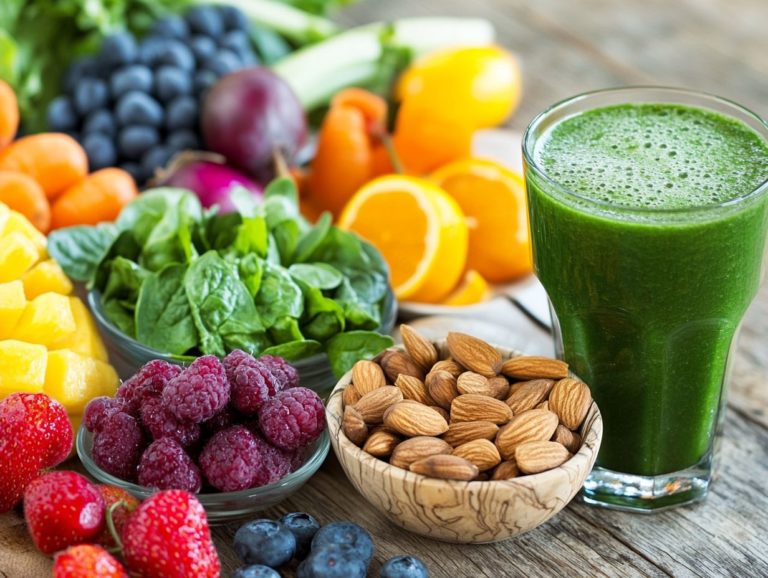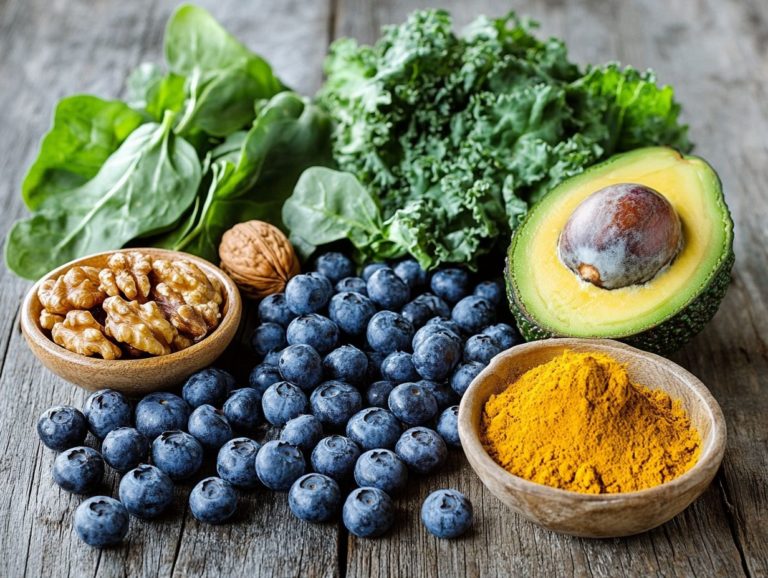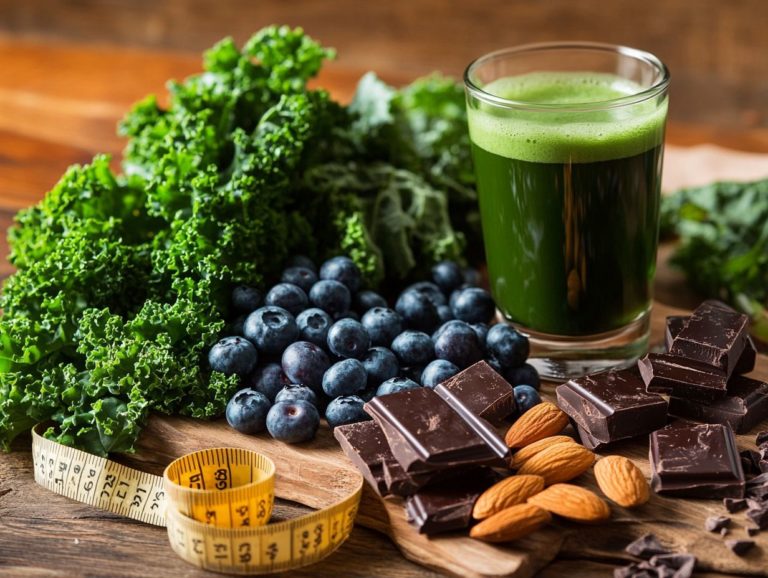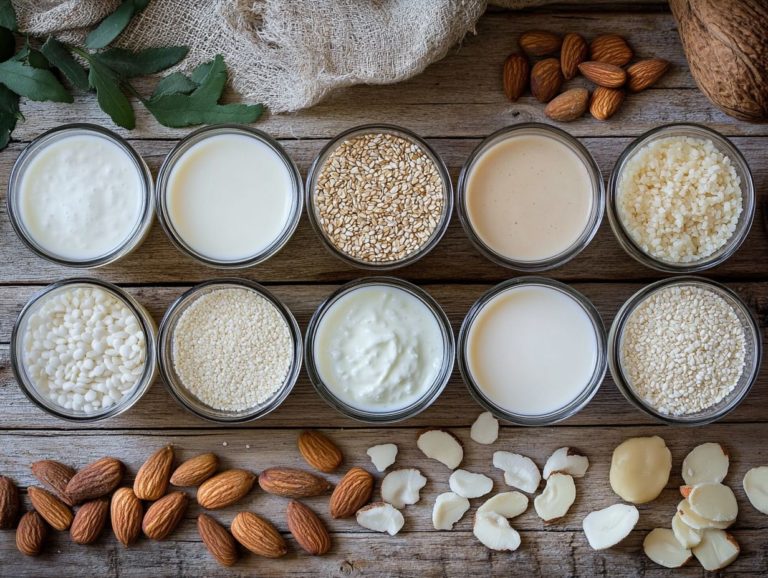Understanding the Role of a Plant-Based Diet
Curious about what a plant-based diet truly involves? You re certainly in good company.
Countless individuals are delving into the remarkable health benefits this lifestyle offers, ranging from enhanced nutrient intake to a diminished risk of chronic diseases.
Whether you aim to fully transition or merely wish to infuse more plants into your meals, this article will serve as your comprehensive guide. It will navigate essential tips, common challenges, and clarify popular misconceptions.
Uncover the vibrant realm of plant-based eating and explore how it can revolutionize your health!
Contents
- Key Takeaways:
- Health Benefits of a Plant-Based Diet
- How to Transition to a Plant-Based Diet
- Potential Challenges and Solutions
- Plant-Based Diet Myths and Facts
- Frequently Asked Questions
- What is a plant-based diet?
- What are the benefits of following a plant-based diet?
- Are plant-based diets suitable for everyone?
- What are some common misconceptions about plant-based diets?
- Can plant-based diets provide enough protein for muscle building and maintenance?
- What are some tips for transitioning to a plant-based diet?
Key Takeaways:
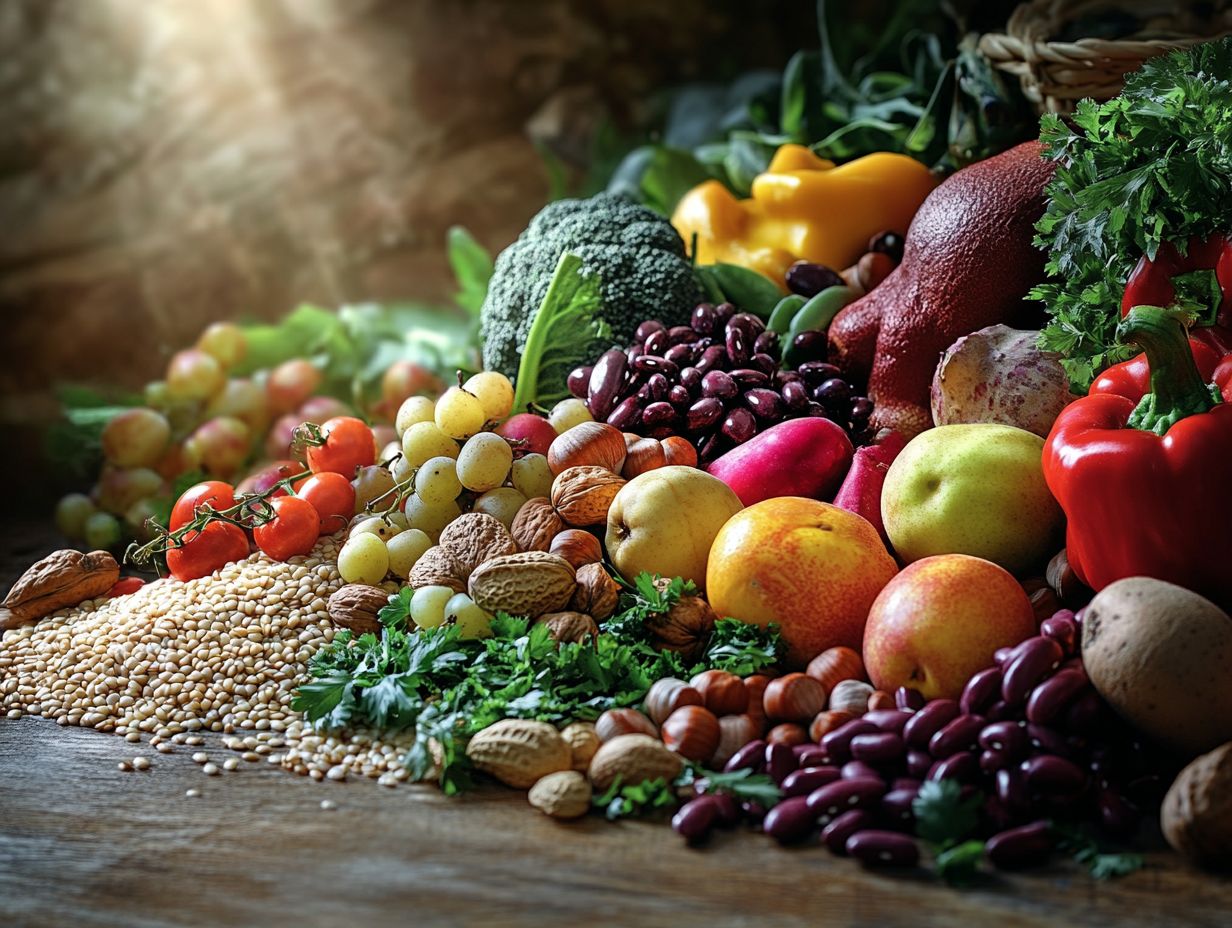
Eating a plant-based diet can improve nutrient intake and reduce the risk of chronic diseases. Transitioning to a plant-based diet may be challenging, but tips and solutions can help overcome obstacles and maintain a balanced diet. Don’t believe the myths this diet can provide all necessary nutrients and is a sustainable, healthy option for all individuals.
What is a Plant-Based Diet?
A plant-based diet is a nutritional approach that emphasizes whole, minimally processed meals primarily made up of fruits, vegetables, legumes, nuts, and seeds. It minimizes or eliminates animal products from your plate.
This dietary trend not only promotes increased intake of essential nutrients but is also linked to a variety of health benefits, such as improved energy levels and enhanced overall well-being.
By adopting this lifestyle, you re not just supporting your health; you’re also contributing positively to environmental sustainability.
When you focus on a diverse array of fruits and vegetables, you embrace a rich spectrum of vitamins, minerals, and antioxidants. These nutrients boost your immune function and reduce the risk of chronic diseases.
Including legumes and whole grains enhances protein intake and increases fiber consumption, which aids digestion and helps you feel full.
This diet rich in nutrients significantly lowers saturated fat and cholesterol levels while supporting effective weight management.
More people are discovering the powerful connection between food choices and health, and the allure of a plant-based lifestyle continues to flourish.
Health Benefits of a Plant-Based Diet
Discover the amazing health benefits of a plant-based diet that can transform your well-being!
This lifestyle aids in weight management, boosts your energy levels, and lowers your risk of chronic diseases, including diabetes and heart disease.
Research indicates that those who embrace a plant-based approach often enjoy lower rates of obesity, thanks to the high fiber content and nutrient density of plant-based foods.
Improved Nutrient Intake
One standout benefit of adopting a plant-based diet is the remarkable improvement in nutrient intake it offers. By embracing a diverse array of fruits, vegetables, and legumes, you enrich your body with essential vitamins, minerals, and fiber.
This enhanced nutrient diversity can lead to better physical health and an optimally functioning body. Take quinoa, for example. It s a protein source that contains all essential amino acids, making it an excellent option for anyone looking to swap out animal protein.
Avocados are brimming with healthy monounsaturated fats that support heart health and enhance cholesterol levels.
Legumes, like lentils and chickpeas, are also nutritional heavyweights, providing significant amounts of iron and folate, which are crucial for energy production and overall vitality.
When you compare plant-based diets to traditional ones, it s clear that the former often has a higher fiber content while steering clear of the unhealthy saturated fats commonly found in animal products. This promotes a healthier digestive system and reduces the risk of chronic diseases.
Reduced Risk of Chronic Diseases
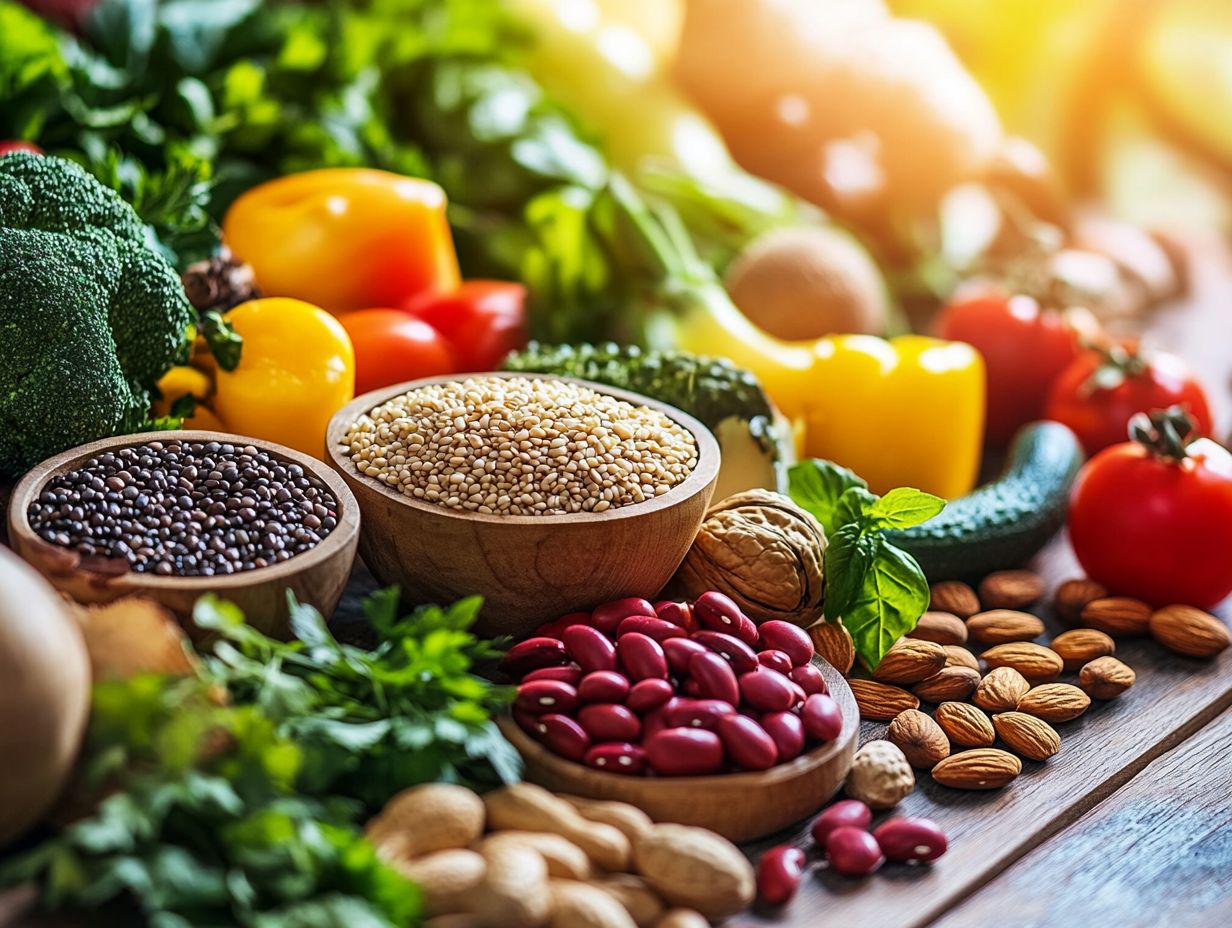
Embracing a plant-based diet can dramatically lower your risk of chronic diseases like heart disease, Type 2 diabetes, and obesity. This is mainly due to the wealth of antioxidants and phytonutrients found in plant foods. For more insight, check out this understanding of the whole food plant-based diet.
Research shows that adopting this dietary approach helps nurture a healthy gut microbiome. A healthy gut is vital for your overall health.
Studies indicate that people who stick to this way of eating often show a significant reduction in inflammatory markers. Improved lipid profiles are also key players in disease prevention.
A diet rich in colorful fruits and vegetables provides essential vitamins and minerals. It also reduces the likelihood of conditions like hypertension and certain cancers.
Chronic diseases account for nearly 70% of deaths worldwide. It s clear that adding more plant-based options to your meals is essential.
How to Transition to a Plant-Based Diet
Transitioning to a plant-based diet can be easy. With the right meal planner and a gradual approach, you can add more plant-based foods to your routine.
Focus on whole-food options and adjust your dietary habits over time. This way, you can enjoy the benefits of this lifestyle without the stress of a sudden change.
Tips for Incorporating More Plants in Your Diet
Incorporating more plants into your diet is simple. Just add an extra serving of fruits or vegetables to each meal, or swap animal products for legumes.
This not only brings a variety of flavors but also offers numerous health benefits.
Starting your week with meal prep can make cooking easier. It allows you to explore new recipes without the daily planning stress.
Consider adding nutrient-rich foods like quinoa, lentils, and chickpeas to your meals. They provide both protein and fiber.
Try small swaps, like using almond milk instead of dairy or adding nutritional yeast for a cheesy flavor. These changes can elevate your dishes.
Experiment with seasonal fruits and vegetables. This brings variety to your meals and supports local agriculture.
Potential Challenges and Solutions
Transitioning to a plant-based diet can present challenges. You may need to ensure balanced nutrition and navigate social situations.
Understanding these challenges helps you find practical solutions. This way, you can enjoy a rewarding plant-based lifestyle while keeping your health in check.
Overcoming Obstacles and Maintaining a Balanced Diet
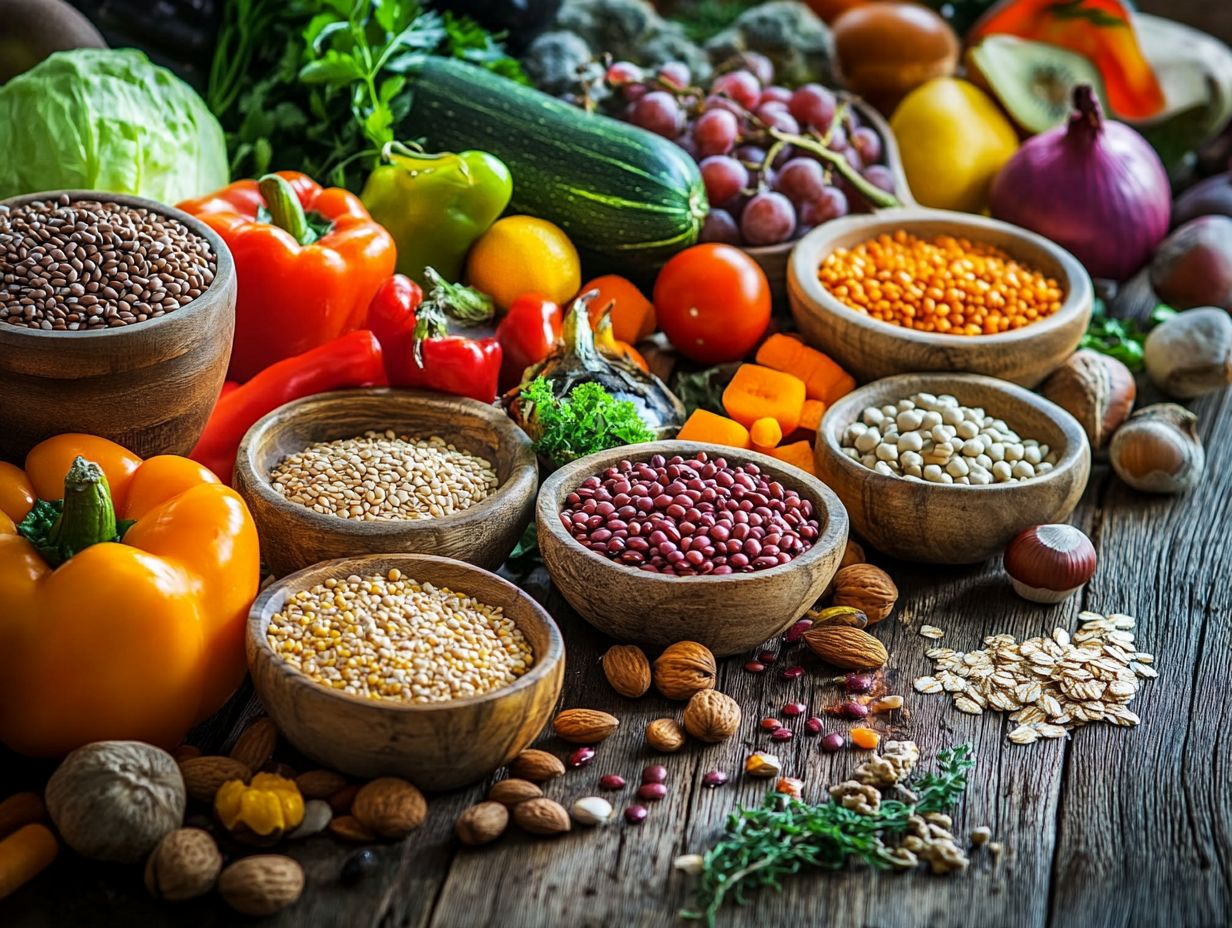
Overcoming obstacles to maintain a balanced plant-based diet is achievable. Make sure you get enough healthy fats, proteins, and essential nutrients.
This balance is crucial for energy and enjoying the diverse flavors of plant-based foods.
Include a variety of fruits, vegetables, whole grains, nuts, and legumes in your meals. Different colors and textures make your meals both appealing and nutritious.
To get healthy fats, try:
- Avocados
- Chia seeds
- Walnuts
For protein, incorporate:
- Quinoa
- Lentils
- Chickpeas
By embracing these strategies, you’ll create meals that are both exciting and fulfilling while supporting your health.
Plant-Based Diet Myths and Facts
You might encounter myths about plant-based diets that create confusion about their nutritional value. This is especially true regarding protein sources and the need for animal products.
By dispelling these myths, you can discover the true benefits and possibilities of a plant-based lifestyle.
Debunking Common Misconceptions
Debunking common misconceptions about the plant-based diet is vital for deepening your understanding of its health benefits, especially regarding protein sources and essential nutrients. Many people mistakenly believe that a plant-based diet lacks sufficient protein. However, numerous plant foods provide ample amounts for a healthy lifestyle.
Research illustrates that various plant-based foods like lentils, chickpeas, quinoa, and tempeh are not only rich in protein but also contain the building blocks of protein that your body needs. For example, a cup of cooked lentils offers around 18 grams of protein. Additionally, quinoa boasts all nine essential amino acids, making it a complete protein source. These foods are often brimming with vitamins, minerals, and fiber, contributing to better digestion and improved health outcomes.
By incorporating a diverse array of plant foods into your meals, you can effortlessly meet and even exceed your protein needs. This demonstrates that a well-planned plant-based diet can be both nutritionally adequate and incredibly beneficial.
Frequently Asked Questions
What is a plant-based diet?

A plant-based diet focuses on consuming mostly or entirely plant-based foods such as fruits, vegetables, whole grains, legumes, nuts, and seeds. It excludes or minimizes the consumption of animal products like meat, dairy, and eggs.
What are the benefits of following a plant-based diet?
There are many potential benefits to following a plant-based diet. These include improved heart health, weight loss, a lower risk of certain diseases such as type 2 diabetes and some types of cancer, and a reduced environmental impact.
Are plant-based diets suitable for everyone?
Plant-based diets can be suitable for most individuals. However, it’s essential to talk to your doctor to ensure a smooth transition if you’re making significant dietary changes. Certain medical conditions or nutritional needs may require modifications to a plant-based diet.
What are some common misconceptions about plant-based diets?
One common misconception is that plant-based diets lack necessary nutrients like protein, iron, and calcium. However, with proper planning and variety, plant-based diets can provide all the essential nutrients you need. Many people also think that plant-based diets are expensive. Still, they can actually be budget-friendly if you focus on whole, unprocessed foods.
Can plant-based diets provide enough protein for muscle building and maintenance?
Yes, plant-based diets can provide enough protein for muscle building and maintenance. Good sources of plant-based protein include beans, lentils, tofu, tempeh, nuts, seeds, and whole grains.
What are some tips for transitioning to a plant-based diet?
Some tips for transitioning to a plant-based diet include gradually increasing the amount of plant-based foods in your meals, experimenting with new recipes and ingredients, and finding plant-based alternatives to your favorite foods. Dive into nutrition knowledge to maximize your plant-based journey!

